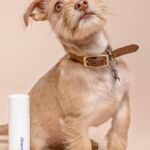
If you’ve ever been greeted by your furry friend’s less-than-pleasant breath, you’re not alone. In “Natural Remedies for Dog Bad Breath: Freshen Your Canine’s Breath Naturally,” you’ll discover a variety of holistic strategies to help bring your pup’s oral health back on track. By incorporating canine wellness supplements, and exploring natural remedies, you can support your dog’s overall health and well-being. From dietary changes to choosing the best natural health products for your dog, this guide offers practical tips that can make a big difference. Say goodbye to bad breath and hello to a healthier, happier companion! Have you ever snuggled up to your furry friend only to be met with a less-than-pleasant smell emanating from their mouth? Dog bad breath isn’t just a nuisance; it can sometimes be a sign of underlying health issues. Don’t worry! We’re here to discuss natural remedies to freshen your canine’s breath, keeping them happy and you content.
Understanding The Causes of Bad Breath in Dogs
Before diving into remedies, it’s essential to understand the root causes of bad breath in dogs. Just like humans, dogs can suffer from various oral health issues contributing to unpleasant breath.
Causes of Bad Breath
Bad breath in dogs, medically known as halitosis, often results from an overgrowth of bacteria in their mouth. Here are some common causes:
- Dental Disease: Accumulation of plaque and tartar can lead to periodontal disease, which is a significant cause of bad breath.
- Poor Diet: Consuming low-quality food or certain human foods can contribute to foul-smelling breath.
- Medical Conditions: Conditions like diabetes, kidney disease, and liver issues can manifest as bad breath.
- Digestive Issues: Problems in the digestive tract can also cause bad breath in dogs.
- Foreign Objects: Sometimes small objects can get stuck in a dog’s teeth or gums, leading to an infection and bad breath.
Knowing these potential causes will help you address them more effectively, ensuring your dog’s health and happiness.
Natural Remedies to Combat Bad Breath
The great news is, you can tackle your dog’s bad breath without resorting to harsh chemicals or expensive treatments. Let’s explore some natural remedies that can make a big difference.
Regular Brushing
Brushing your dog’s teeth regularly is the most effective way to combat bad breath. Use a vet-approved canine toothpaste, as human toothpaste can be toxic to dogs.
How To Brush Your Dog’s Teeth
- Choose the Right Time: Pick a calm and quiet time.
- Start Slowly: Let your dog get used to the idea of brushing by touching their mouth and showing them the brush.
- Use Gentle Strokes: Use soft, circular motions on the teeth and gums.
Regular brushing helps reduce plaque buildup and keeps your canine’s breath fresh.
Dental Chews and Toys
Dental chews and toys are designed to help clean your dog’s teeth as they chew. These products not only freshen breath but also keep your dog entertained.
Popular Dental Chews
| Name | Benefits |
|---|---|
| Greenies | Reduce plaque and tartar, freshen breath |
| Whimzees | Natural ingredients, promote oral health |
| Blue Buffalo Dental Bones | Maintain healthy teeth and gums |
Choosing the right dental chew can make a significant difference in your dog’s oral health.
Healthy Diet
A balanced diet is crucial for maintaining a dog’s overall health, including their breath. Ensure your dog’s food is nutritionally complete and free from low-quality fillers.
Foods to Include
| Food Type | Examples |
|---|---|
| High-quality kibble | Vet-recommended brands |
| Fresh vegetables | Carrots, celery |
| Raw bones | Beef or lamb bones (always supervise) |
Switching to a healthier diet can improve not just breath, but overall well-being.
Fresh Herbs
Certain herbs can naturally freshen your dog’s breath. Parsley and mint, for example, have properties that combat bad breath.
How to Use Herbs
- Parsley: Chop some fresh parsley and sprinkle it over your dog’s food.
- Mint: Add a small amount of finely chopped mint leaves to their meal.
These herbs are not only safe but also beneficial to your dog’s health.
Probiotics
Probiotics help balance the bacteria in your dog’s gut, which can positively impact their breath.
Probiotic Benefits
- Improved Gut Health: Supports a healthy digestive system.
- Balanced Bacteria: Reduces bad breath-causing bacteria.
Probiotics are available as supplements or can be found in certain types of dog food.
Coconut Oil
Coconut oil has antibacterial properties that are good for your dog’s health and can improve their breath.
How to Use Coconut Oil
- Food Supplement: Add a small amount to your dog’s food.
- Oral Application: Apply directly to your dog’s teeth and gums with your finger or a soft brush.
Introducing coconut oil can help combat bacteria and boost oral health naturally.
Apple Cider Vinegar
Apple cider vinegar is another natural remedy for bad breath due to its antibacterial properties.
How to Use Apple Cider Vinegar
- Water Additive: Add a teaspoon of apple cider vinegar to your dog’s water bowl.
- Food Additive: Mix a small amount into their food.
Ensure you use only a small quantity to avoid upsetting your dog’s stomach.
Carrots and Apples
Raw carrots and apples can act as natural toothbrushes, helping to remove plaque and freshen breath.
Serving Suggestions
- Carrots: Offer raw, chopped carrots as a treat.
- Apples: Give slices of apple (ensure seeds are removed).
These healthy snacks provide a crunchy texture that aids in cleaning your dog’s teeth.
Hydration
Adequate hydration is essential for maintaining good health, including fresh breath.
Tips for Hydration
- Clean Water: Ensure your dog has access to fresh, clean water at all times.
- Moist Food: Incorporate wet food into their diet to increase hydration.
Keeping your dog well-hydrated helps maintain their oral health.
Regular Veterinary Checkups
Regular veterinary visits are crucial for maintaining your dog’s overall health, including dental checkups.
Importance of Vet Visits
- Early Detection: Identifies potential health issues early.
- Professional Cleaning: Provides thorough cleaning of teeth and gums.
Discuss any concerns, including bad breath, with your vet to ensure it’s not related to an underlying health issue.

Supplementing Your Dog’s Diet
Natural supplements can support your dog’s dental and overall health. Picking the right supplements can have significant benefits.
Common Supplements for Dogs
Omega-3 Fatty Acids
Omega-3s support healthy skin, coat, and oral health. Fish oil is a popular source of these essential fatty acids.
Glucosamine and Chondroitin
These supplements are well-known for supporting joint health, but they also contribute to overall well-being, which can impact breath.
Probiotics
As mentioned earlier, probiotics help balance gut bacteria, leading to fresher breath.
Multivitamins
Ensure your dog receives all essential nutrients by incorporating a high-quality multivitamin into their diet.
Natural Dental Supplements
Certain supplements are specifically designed to support dental health, such as those containing CoQ10, an enzyme that supports gum health.
Choosing the Right Supplement
Selecting the right supplement involves considering your dog’s age, breed, and specific health needs. Always consult with your veterinarian before starting any new supplement.
Diet Considerations
A well-balanced diet plays a critical role in maintaining your dog’s oral health and fresh breath. Here are some key considerations:
High-Quality Commercial Food
Opt for high-quality commercial dog food that meets AAFCO standards, ensuring it provides balanced nutrition.
Brands to Consider
| Brand | Benefits |
|---|---|
| Hill’s Science Diet | Veterinarian-recommended, balanced nutrition |
| Royal Canin | Tailored formulas for different breeds |
| Blue Buffalo | Natural ingredients, no artificial additives |
Homemade Diets
Preparing homemade meals ensures you know exactly what your dog is consuming.
Basic Recipe Idea
| Ingredient | Portion |
|---|---|
| Lean meat (e.g., chicken, beef) | 1/3 of the meal |
| Vegetables (e.g., carrots, peas) | 1/3 of the meal |
| Carbohydrates (e.g., rice, potatoes) | 1/3 of the meal |
Raw Diets
Raw diets consist of uncooked meats, bones, and organs, along with fruits and vegetables.
Benefits of Raw Diet
- Natural Enzymes: Beneficial for digestion and oral health.
- Bone Chewing: Helps clean teeth naturally.
However, raw diets should be carefully balanced and guided by a veterinarian to avoid nutritional deficiencies.

Lifestyle and Environmental Factors
Certain lifestyle factors can influence your dog’s breath and overall health.
Regular Exercise
Exercise keeps your dog’s body systems functioning well, including the digestive system, which can influence breath.
Recommended Exercise
| Dog Size | Daily Exercise |
|---|---|
| Small | 20-30 minutes |
| Medium | 30-60 minutes |
| Large | 1-2 hours |
Stress Reduction
Stress can impact your dog’s digestive health and breath. Ensuring a calm environment can help maintain your dog’s health.
Stress Reduction Tips
- Routine: Stick to a regular feeding and walking schedule.
- Comfort Items: Provide toys and blankets for comfort.
- Training: Use positive reinforcement during training.
Reducing stress can lead to better digestion and fresher breath.
Clean Living Environment
A clean living environment contributes to your dog’s overall health.
Hygiene Practices
- Regular Cleaning: Keep your dog’s bedding and toys clean.
- Outdoor Spaces: Ensure outdoor spaces are free of feces and other waste.
- Grooming: Regular grooming prevents skin issues that can indirectly affect oral health.
By maintaining these practices, you help promote a healthier lifestyle and fresher breath for your dog.
Common Myths About Dog Bad Breath
Understanding what’s true and what’s not about dog bad breath can help in addressing the issue effectively.
Myth #1: Bad Breath is Normal for Dogs
Many dog owners believe that bad breath is just a normal part of having a dog. While mild breath odor is expected, persistent bad breath usually indicates an underlying issue that needs attention.
Myth #2: Dogs Don’t Need Dental Care
Some believe that dogs don’t require dental care or that dental issues are not serious. In reality, dental disease is very common in dogs and can lead to more severe health problems if left untreated.
Myth #3: Only Older Dogs Get Bad Breath
While it’s true that older dogs might be more prone to health issues causing bad breath, young dogs can also develop halitosis due to various reasons, including diet and oral hygiene.

When to Seek Veterinary Help
While this article focuses on natural remedies, it’s important to know when professional help is required.
Signs That Warrant a Vet Visit
- Persistent Bad Breath: If bad breath continues despite home remedies.
- Visible Dental Issues: Swollen, bleeding gums, or loose teeth.
- Behavioral Changes: Reluctance to eat, chew, or play.
- Other Symptoms: Vomiting, diarrhea, or indications of pain.
What to Expect at the Vet
The veterinarian will perform a physical examination and may suggest dental cleaning or investigate other potential health issues. They may also recommend specific treatments or dietary changes based on the diagnosis.
Conclusion
Natural remedies can effectively combat bad breath in dogs, ensuring a happier and healthier furry companion. From regular tooth brushing to the right diet and supplements, there are numerous ways to promote your dog’s oral health. Remember to consult your veterinarian before making significant changes and to address persistent issues promptly. With these tips, you can keep your canine’s breath fresh naturally and enjoy those close moments without hesitation.







